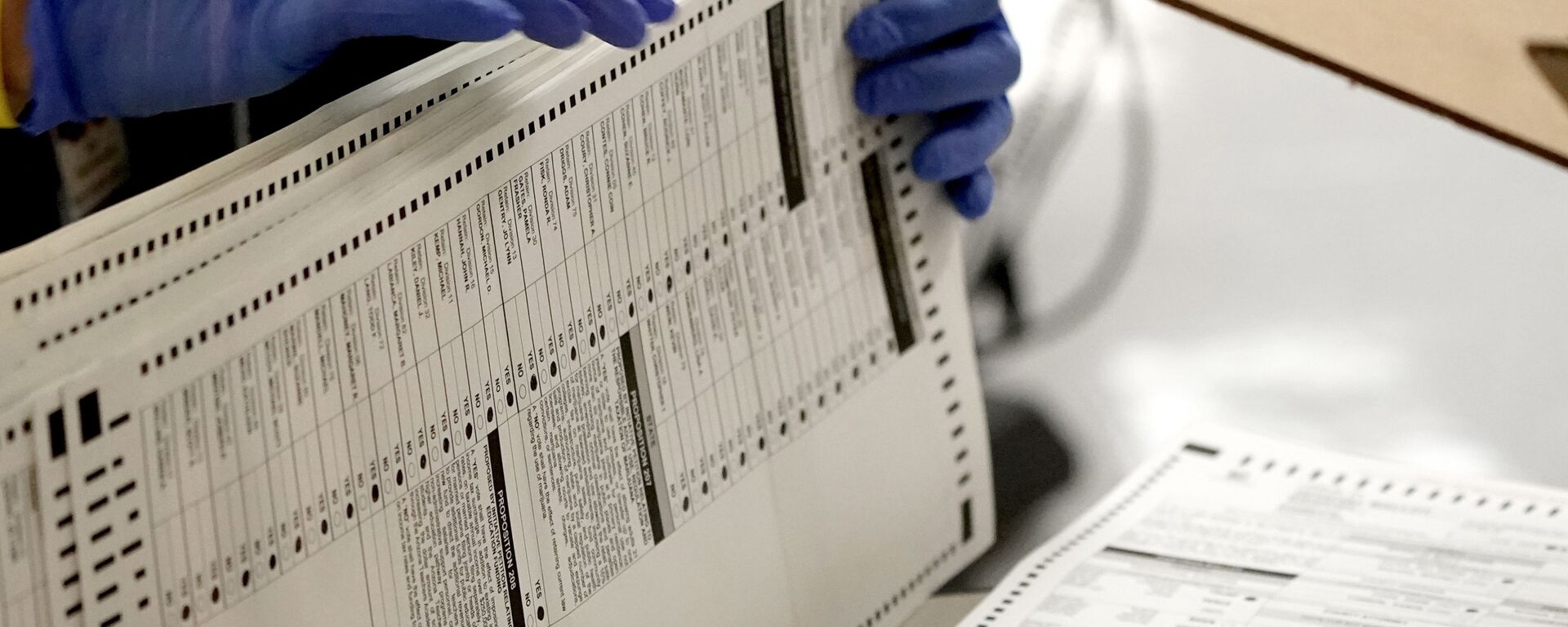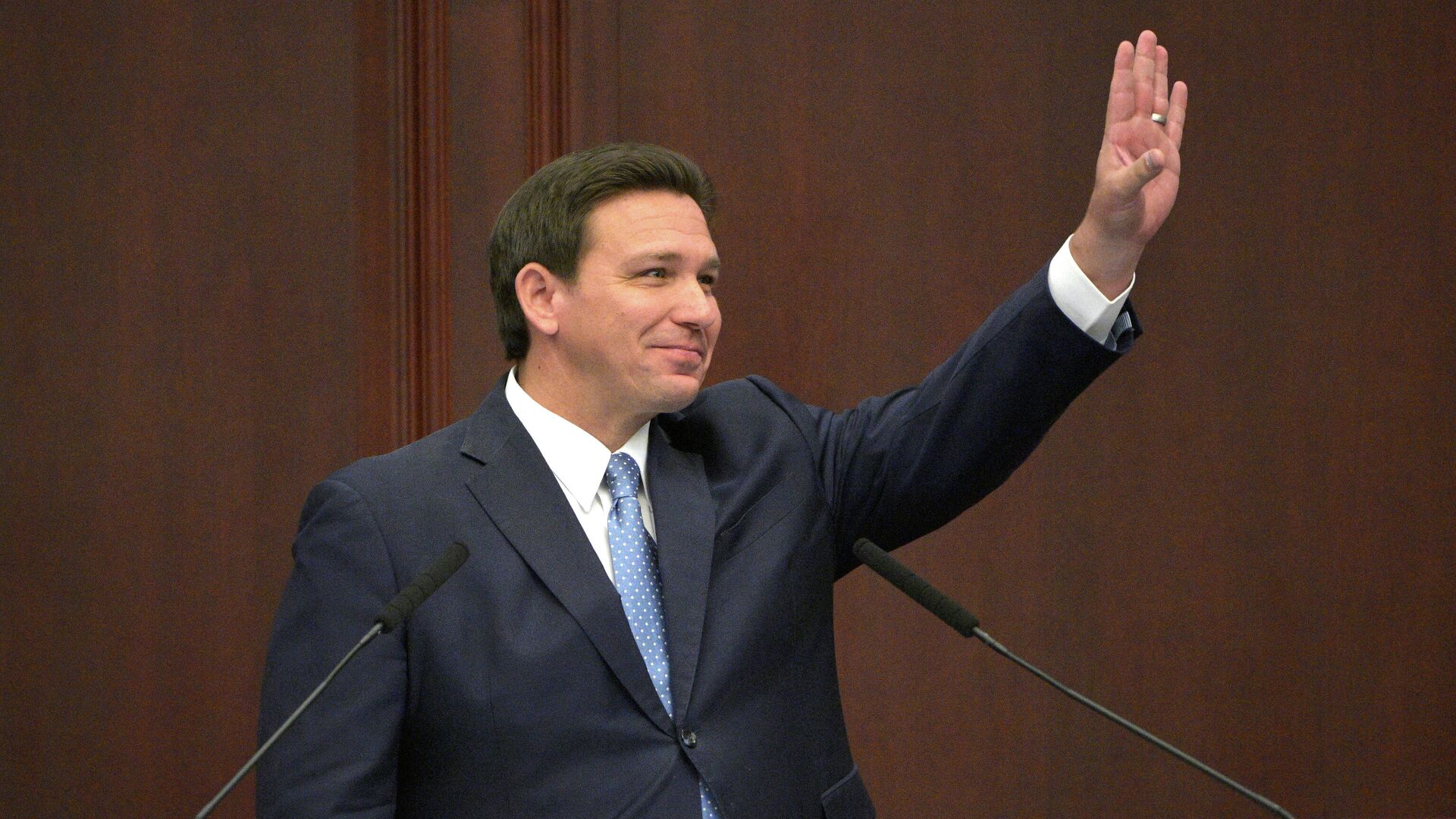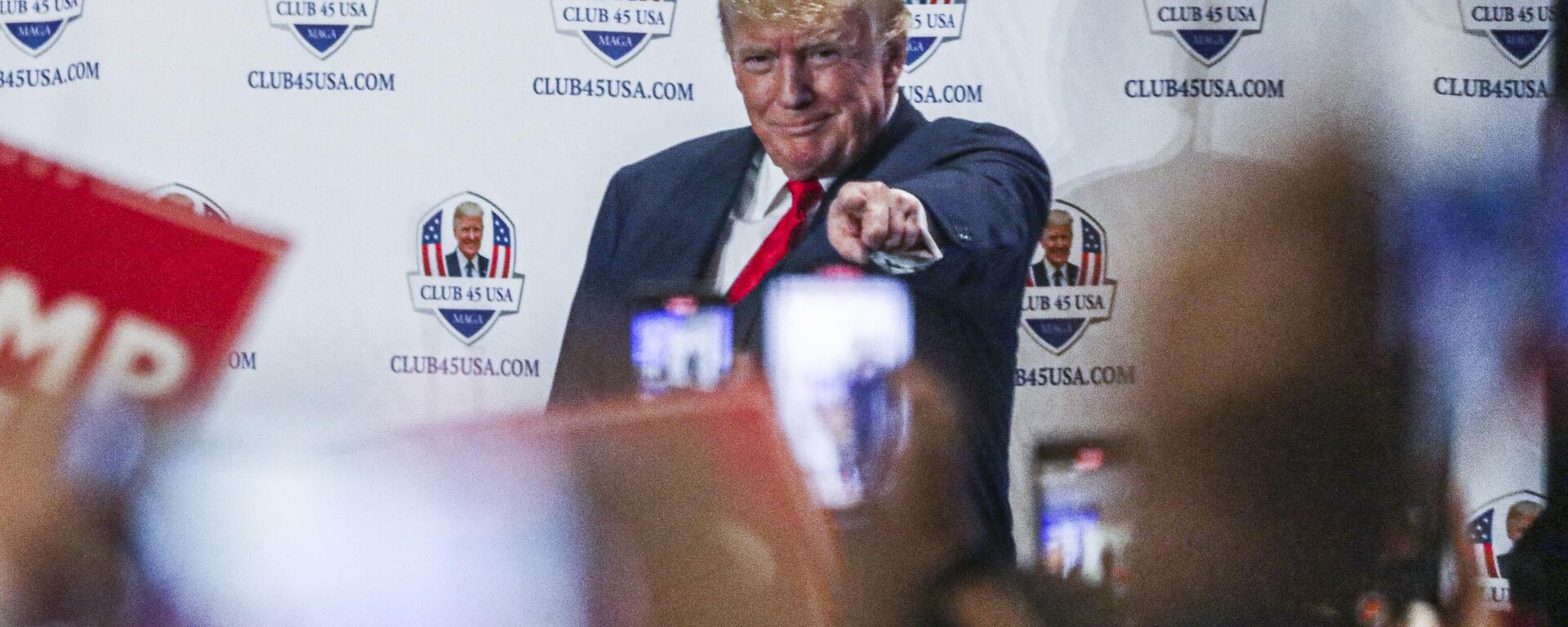https://sputnikglobe.com/20230608/report-us-lawmakers-have-proposed-185-laws-in-2023-that-may-be-used-to-subvert-elections-1111014827.html
Report: US Lawmakers Have Proposed 185 Laws in 2023 That May Be Used to Subvert Elections
Report: US Lawmakers Have Proposed 185 Laws in 2023 That May Be Used to Subvert Elections
Sputnik International
185 bills across 38 states have been introduced since the start of 2023 that could be used to overturn election results.
2023-06-08T22:47+0000
2023-06-08T22:47+0000
2024-03-11T10:58+0000
americas
arizona
texas
south carolina
republicans
republican
florida
election fraud
2024 us presidential election
ron desantis
https://cdn1.img.sputnikglobe.com/img/07e6/01/10/1092287473_0:0:3071:1728_1920x0_80_0_0_18a424cab7929f99bc498e8afa17db47.jpg
185 bills across 38 states have been introduced to state legislatures since the start of this year that could be used to subvert elections, an analysis by three nonpartisan organizations revealed on Thursday.The States United Democracy Center, Protect Democracy and Law Forward noted in their findings that 15 of the bills have already been enacted. Three additional bills were passed by the state legislature but were vetoed by the state’s governor.While most candidates who denied the 2020 election lost their bids in key battleground states, the bills showcase that the movement is still alive, particularly in Republican strongholds. “In fact, legislators are coming up with new ways to interfere with elections,” Maya Ingram, a senior policy development counsel at the States United Democracy Center said.The report also notes that 2020 election deniers won key seats in state legislatures and other positions, and that bills that could be used to usurp elections are being introduced at the same rate as their previous report found two years ago.The state that scored the worst is Texas, which has pending or passed bills that meet all five criteria, the only state to do so.Texas’ HB 5082 allows the secretary of state to order new elections in counties with a population over 1 million–which only applies to six of the 254 counties in Texas–when there is “good reason” to believe those counties ran out of ballots during voting hours and were not replenished within an hour. Some of those counties lean Democratic, while the secretary of state and governor who appointed her are currently Republicans.Arizona's SB 1695 would prohibit election officials from canvassing the election if an election official has violated any election law or provision of the Election Procedures Manual, even minor infractions, and enough voters claim disenfranchisement. That will cause the canvass to be delayed until a special master is appointed to review affidavits and other facts.If the court declares a “failed election,” it can order a new one. In Arizona, a voter can be considered disenfranchised if they have to wait in line for more than 90 minutes.While the study says requiring election officials to follow the rules and reduce voting lines are noble goals, it argues the law is structured in a way that would enable the special master to hijack the election and “overturn the will of the voters.”Arizona HB 2078 allows candidates, chairs of political parties and chairs of ballot measure political committees to request an audit on elections by the secretary of state but does not set a standard for what is required to institute the audit.Several states, including Arizona, South Carolina, and Virginia have introduced bills that would ban the use of machines to count votes, forcing them to be counted by hand instead, which could delay election results and is more prone to errors. Arizona’s bill, HB 2100, goes a step further, mandating that they be counted by hand within 24 hours after the polls close, something experts say is a physical impossibility, according to the study.In Florida, the state legislature has empowered the state’s attorney with expanded powers to prosecute election fraud, even though such cases are extremely rare. The bill was quickly passed after a court ruled that some of the 20 people arrested by Florida for election fraud could not be prosecuted by the state attorney because he lacked jurisdiction.In that case, all 20 Floridians were former felons who thought they had the right to vote.The report alleges that such laws will have an effect on the 2024 election and could alter voting habits or reduce turnout. While the study says it is unlikely that election subversion will “be as blatant as throwing out the election results altogether and installing a hand-picked winner,” but will instead cause “disorder and confusion.”“Any of these scenarios could create a pretext for partisan actors to throw up their hands, declare that the will of the people is for them to discern, and subvert an election,” the report says.
https://sputnikglobe.com/20221027/they-shall-not-pass-gop-mobilizes-to-prevent-election-fraud-in-states-amid-midterms-1102777406.html
https://sputnikglobe.com/20230321/report-georgia-officials-weighing-rico-charges-against-trump-over-efforts-to-overturn-2020-results-1108621543.html
americas
arizona
texas
south carolina
Sputnik International
feedback@sputniknews.com
+74956456601
MIA „Rossiya Segodnya“
2023
News
en_EN
Sputnik International
feedback@sputniknews.com
+74956456601
MIA „Rossiya Segodnya“
Sputnik International
feedback@sputniknews.com
+74956456601
MIA „Rossiya Segodnya“
2020 presidential election, election fraud, dangers to democracy, election bills
2020 presidential election, election fraud, dangers to democracy, election bills
Report: US Lawmakers Have Proposed 185 Laws in 2023 That May Be Used to Subvert Elections
22:47 GMT 08.06.2023 (Updated: 10:58 GMT 11.03.2024) According to a poll conducted in March, 63% of Republicans and Republican-leaning Independents do not believe Joe Biden won the 2020 election legitimately.
185 bills across 38 states have been introduced to state legislatures since the start of this year that could be used to subvert elections, an analysis by three nonpartisan organizations revealed on Thursday.
The States United Democracy Center, Protect Democracy and Law Forward noted in their findings that 15 of the bills have already been enacted. Three additional bills were passed by the state legislature but were vetoed by the state’s governor.
While most candidates who denied the 2020 election lost their bids in key battleground states, the bills showcase that the movement is still alive, particularly in Republican strongholds. “In fact, legislators are coming up with new ways to interfere with elections,” Maya Ingram, a senior policy development counsel at the States United Democracy Center said.
The report also notes that 2020 election deniers won key seats in state legislatures and other positions, and that bills that could be used to usurp elections are being introduced at the same rate as their previous report found two years ago.
The study defined subversion as any bill that attempts to do one of five things: usurping control over election results, requiring partisan or unprofessional election audits or reviews, seizing power over election responsibilities, creating unworkable burdens in election administration, or imposing disproportionate criminal or other penalties.
The state that scored the worst is Texas, which has pending or passed bills that meet all five criteria, the only state to do so.

27 October 2022, 18:46 GMT
Texas’ HB 5082 allows the secretary of state to order new elections in counties with a population over 1 million–which only applies to six of the 254 counties in Texas–when there is “good reason” to believe those counties ran out of ballots during voting hours and were not replenished within an hour. Some of those counties lean Democratic, while the secretary of state and governor who appointed her are currently Republicans.
Arizona's SB 1695 would prohibit election officials from canvassing the election if an election official has violated any election law or provision of the Election Procedures Manual, even minor infractions, and enough voters claim disenfranchisement. That will cause the canvass to be delayed until a special master is appointed to review affidavits and other facts.
If the court declares a “failed election,” it can order a new one. In Arizona, a voter can be considered disenfranchised if they have to wait in line for more than 90 minutes.
While the study says requiring election officials to follow the rules and reduce voting lines are noble goals, it argues the law is structured in a way that would enable the special master to hijack the election and “overturn the will of the voters.”
Arizona HB 2078 allows candidates, chairs of political parties and chairs of ballot measure political committees to request an audit on elections by the secretary of state but does not set a standard for what is required to institute the audit.
Several states, including Arizona, South Carolina, and Virginia have introduced bills that would ban the use of machines to count votes, forcing them to be counted by hand instead, which could delay election results and is more prone to errors. Arizona’s bill, HB 2100, goes a step further, mandating that they be counted by hand within 24 hours after the polls close, something experts say is a physical impossibility, according to the study.
In Florida, the state legislature has empowered the state’s attorney with expanded powers to prosecute election fraud, even though such cases are extremely rare. The bill was quickly passed after a court ruled that some of the 20 people arrested by Florida for election fraud could not be prosecuted by the state attorney because he lacked jurisdiction.
In that case, all 20 Floridians were former felons who thought they had the right to vote.
In 2018, Florida voters passed an initiative restoring voting rights for some felons, but Florida has not set up a system to inform felons if they are eligible.
In some of the cases, the accused had been given voter documents by the state, including voter registration cards, and were told by state officials that they could vote.
“Rather than fix Florida’s complex and unnavigable system for people with past felony convictions to determine their voting eligibility,” the ACLU Florida office said in a statement about the law, “this new law gives Governor [Ron] DeSantis and his political allies more authority to prosecute alleged voting misconduct that a local prosecutor might not be willing to prosecute because the evidence fails to show an individual willfully broke the law.”
The report alleges that such laws will have an effect on the 2024 election and could alter voting habits or reduce turnout. While the study says it is unlikely that election subversion will “be as blatant as throwing out the election results altogether and installing a hand-picked winner,” but will instead cause “disorder and confusion.”
“Any of these scenarios could create a pretext for partisan actors to throw up their hands, declare that the will of the people is for them to discern, and subvert an election,” the report says.




